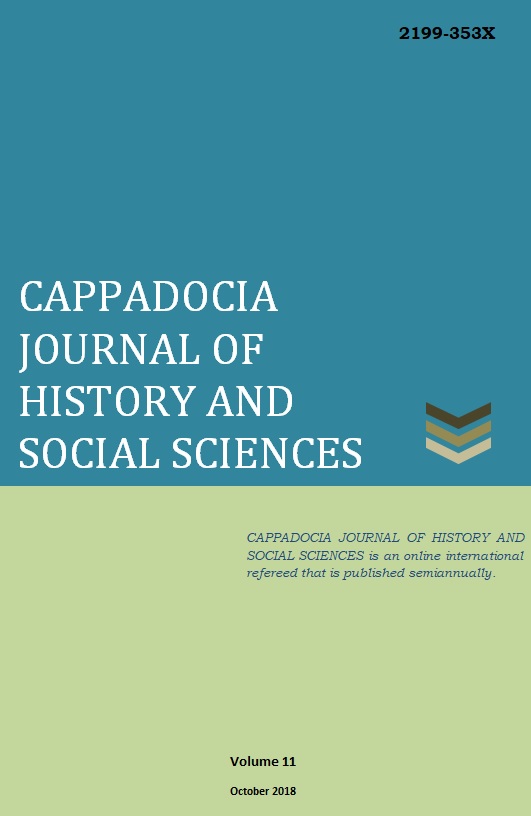MÜHİMME DEFTERLERİNE GÖRE XVI. YÜZYILIN İKİNCİ YARISINDA OSMANLI DEVLETİ’NDE VERGİ MUÂFİYETİ: KÖPRÜCÜLÜK ÖRNEĞİ
Author :
Abstract
Bu makalede Osmanlı Devleti’nin XVI. yüzyılın ikinci yarısında Anadolu ve Rumeli Beylerbeyliklerinde uyguladığı vergi muâfiyetinin sebepleri, muâfiyet verdiği vergiler, devletin ve halkın muâfiyete bakışı Mühimme Defterleri’nden tespit edilen hükümler doğrultusunda köprücülük örneğinde incelenmeye çalışılmıştır. Bu cümleden olmak üzere bu makalenin konusunu köprülerin inşa edilmesi, bakımı ve tamiri, köprücülerin görevleri ve bu göreve atanma prosedürleri, köprücülerin muâfiyet prosedürü, muâf oldukları vergiler ve köprücülerin vergi muafiyeti konusunda yapılan suistimaller oluşturmaktadır. Köprücülerin görevi köprülerin bakımını, tamirini yapmak ve yolcuların güvenliğini sağlamaktı. Osmanlı Devleti, köprücülere bu stratejik hizmetleri karşılığında vergi muâfiyeti tanımıştı. Devletin XVI. yüzyılın ikinci yarısında yaşadığı ekonomik ve sosyal sıkıntılar halkın vergi vermemek için gerekli olmayan yerlere köprü inşa etmelerine ve köprücü olduklarını iddia etmelerine yol açtığı gibi köprücülerin görevlerini yerine getirmemelerine de sebep olmuştur. Makalenin kaynağını oluşturan Mühime Defterlerine Divân-ı Hümâyun’da alınan kararlar kaydedilirdi. Bu sebeple Mühimme Defterleri, Osmanlı Devleti’nin siyasi, içtimai, askerî ve iktisadi yapısı hakkında önemli bir kaynaktır.
Keywords
Abstract
İn this article, it has been aimed to examine, on the köprücülük and in accordance with the decrees contained in Mühimme defters, the reasons behind the tax exemption applied by the Ottoman State for Anatolian and Rumelian Provinces in the second half of the XVIth century, as well as the types of exempted taxes and the perception of state and society towards tax exemption.Therefore, the subject of this article covers the establishment of bridges, maintenance and repair of the bridges, the duties of the köprücü, exemption procedure of köprücü, tax exemptions which köprücü was subjected to and the abuse of tax exemption of the köprücü. The duties of the köprücü were to maintenance and repair to the bridges and provided the safety of the passengers. The Ottoman State had granted tax exemption for the ‘köprücü’ who carried out a strategic mission, in return of his service. The economic and social depression encountered by the Ottoman State throughout the second half of the XVIth century have led the people to claim themselves being köprücü to avoid tax charge, and led to köprücü failure to fulfill his duties. The Mühimme defters on which the decisions taken in the Divân-ı Hümâyun have been recorded are some important resources concerning the political, social, economical and military structure of the Ottoman State.
Keywords
- , BaĢbakanlık Devlet ArĢivleri Genel Müdürlüğü Osmanlı ArĢivi Daire BaĢkanlığı, Ġstanbul 2010. GÜÇER, Lütfi, “ XVI-XVIII. Asırlarda Osmanlı Ġmparatorluğunun Ticaret Politikası”, Türk İktisat Tarihi Yıllığı, S.1, 1987, s. 1-128. eriĢim tarihi 10/10/2017, http://dergipark.ulakbim.gov.tr/iutity/article/viewFile/1023014580/1023013796
- HALAÇOĞLU, Yusuf, Osmanlılarda Ulaşım ve Haberleşme (Menziller), Ġlgi Kültür Sanat, Ġstanbul, 2014.
- ĠNALCIK, Halil, Devlet-i Aliyye Osmanlı İmparatorluğu Üzerine Araştırmalar-I Klâsik Dönem (1302-1606) Siyasal, Kurumsal ve Ekonomik Gelişim, Türkiye ĠĢ Bankası Yayınları, Ġstanbul, 2009.
- , Eren Yayıncılık, Ankara, 2009, s.31-65. ĠPġĠRLĠ, Mehmet, “Osmanlın Esas Yapısının Bozulması ve Islahı ÇalıĢmaları Üzerine Gözlemler”, Türkler, C. 9, Yeni Türkiye Yayınları, 2002, s. 839-846. KURT, Yılmaz, “XVI. Yüzyılda Kars -ı MaraĢ Sancağı‟nda Muâflar ve Muâfiyet Sebepleri”, 38. Uluslararası Icanâs Kongresi Bildirileri, 10-15 Eylül 2007, IV, http://www.ayk.gov.tr/wpcontent/uploads/2015/01/KURT-Y%C4%B1lmaz-XVI.-Y%C3%9CZYILDA-KARS-I-MARA%C5%9ESANCA%C4%9EI%E2%80%99NDA-MU%E2%80%99%C3%82FLAR-VEMU%E2%80%99%C3%82F%C4%B0YET-SEBEPLER%C4%B0.pdf., eriĢim tarihi 19.06.2015, s.20072022. KÜTÜKOĞLU, Mübahat S., “Mühimme Defterleri”, TDVİA, C. 31, Ankara, 2006, s. 520-523. ORHONLU, Cengiz - Turgut IĢıksal, “Osmanlı Devrinde Nehir Nakliyatı Hakkında AraĢtırmalar DĠCLE VE FIRAT NEHĠRLERĠNDE NAKLĠYAT”, Tarih Dergisi, Cilt 13, S.17-18,1963, http://www.journals.istanbul.edu.tr/iutarih/article/view/1023002211/1023001848, eriĢim tarihi 25.05.2015, s. 77-102. ORHONLU, Cengiz, „Köprücülük‟, Osmanlı İmparatorluğunda Şehircilik ve Ulaşım Üzerine Araştırmalar, (Derleyen Salih Özbaran), Ege Üniversitesi Edebiyat Fakültesi Yayınları No 31, Ġzmir, 1984, s. 70-76. ÖZTÜRK, Nazif, “Osmanlı Döneminde Vakıflar”, Türkler, C. 10, Yeni Türkiye Yayınları, Ankara, 1999, s.447-460. SERTOĞLU, Mithat, Osmanlı Tarih Lügatı, Enderun Kitabevi, Ġstanbul, 1988. TAġTEMĠR, Mehmet, “Klasik Devirde Osmanlı‟da Kara UlaĢımı ve Yollar”, Osmanlı’da Ulaşım, (Ed. Vahdettin Engin, Ahmet Uçar, Osman Doğan), Çamlıca Basım Yayın, Ġstanbul, 2012, s. 13-31. YEDĠYILDIZ, Bahaeddin, “Müessese-Toplum Münâsebetleri Çerçevesinde XVIII. Asır Türk Toplumu ve Vakıf Müessesesi”, Vakıflar Dergisi, Sayı 15,1982, s. 23-53.
